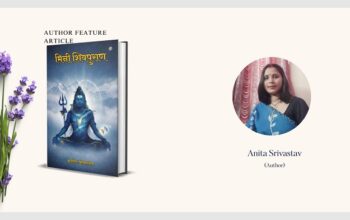Divya Mahobia is the imaginative force behind Emma Faraday and the Shadow’s Dawn, a spellbinding tale of elemental magic, hidden realms, and courageous hearts. Drawing on her fascination with mythology and multiverse lore, Divya weaves rich characters who face impossible odds with resilience, wit, and the power of friendship. When she’s not crafting new adventures, Divya is dreaming up fresh twists for her growing universe of magic. Through her writing, Divya invites readers to believe that even the smallest spark of hope can challenge the deepest shadows.
The Literature Times: Author, welcome to The Literature Times. Congratulations on the publication of your book! What feedback do you get from your readers? Please share your thoughts on this book.
Divya Mahobia: Thank you so much! It’s a true honor to be welcomed by The Literature Times.
The feedback from my readers has been incredibly heartening. Many have shared that Emma Faraday and the Shadow’s Dawn drew them in with its layered magic system, emotional depth, and strong, relatable characters. Some readers connected deeply with Emma’s journey—her grief, her courage, and her determination to stand against darkness even when the odds feel impossible. Others have praised the uniqueness of the elemental magic and the world-building that unfolds with each chapter.
For me, this book is more than a fantasy adventure—it’s a story about resilience, the legacy of loss, and the quiet strength it takes to keep going. I wanted to create a world where magic feels real but also deeply personal, where each power comes with a price, and where young heroes like Emma must rise—not because they want to, but because they must.
I’m grateful for every reader who’s joined Emma’s journey so far, and I can’t wait to share more of what lies ahead in her world.
The Literature Times: What motivates you to become a writer?
Divya Mahobia: What motivates me to become a writer is the deep desire to tell stories that matter—stories that linger in the heart, ignite the imagination, and offer comfort or courage to those who need it most. Writing allows me to explore questions I don’t always have answers to, to build worlds where magic is real, and to give voice to characters who face challenges with bravery and vulnerability.
I’ve always been fascinated by how a single story can change someone’s perspective or make them feel less alone. That power—to connect, to inspire, to heal—is what truly drives me. Whether it’s a tale of elemental magic or a quiet moment of self-discovery, I write to share that spark of hope, adventure, and transformation.
The Literature Times: What are your favourite writing topics? Please tell us a little bit about your literary interests.
Divya Mahobia: I’m especially drawn to writing fantasy—particularly stories with rich magical systems, hidden realms, and emotionally driven characters. I love exploring themes like inner strength, identity, grief, and the battle between light and shadow. Elemental magic, multiverse theory, and ancient myths often find their way into my stories, creating layered worlds that feel both timeless and personal.
Literarily, I’m fascinated by character arcs that show growth through adversity and by stories where young protagonists must rise against overwhelming odds. I enjoy blending fast-paced adventure with emotional depth, allowing readers to escape into another world while still seeing reflections of their own struggles and hopes.
Outside of fantasy, I also appreciate writing character-driven drama and stories with a hint of mystery or spiritual exploration. Anything that stirs the imagination and the heart—that’s where my passion lies.
The Literature Times: We were hoping you might tell us about some of the authors that have influenced you and who you read!
Divya Mahobia: Two authors who have deeply influenced my journey as a writer are J.K. Rowling and Ravinder Singh, the author of Will You Still Love Me?
J.K. Rowling’s Harry Potter series sparked my love for fantasy and storytelling at a young age. Her ability to create a magical world filled with rich lore, emotional depth, and unforgettable characters inspired me to build my own universe where magic and meaning go hand in hand.
On the other hand, Ravinder Singh’s emotional storytelling in Will You Still Love Me? Touched me deeply. His exploration of love, loss, and human connection reminded me of the power of vulnerability in writing. His work taught me that stories don’t need grand settings to leave a lasting impact—they just need heart.
Both authors, in their own unique ways, shaped how I approach my writing: with imagination, emotion, and a desire to connect with readers on a personal level.
The Literature Times: The title is unique and appealing; how did you come up with them? Please tell us the story behind it.
Divya Mahobia: Thank you! The title Emma Faraday and the Shadow’s Dawn came to me as I began exploring the emotional core of the story. I wanted a title that reflected both Emma’s personal journey and the larger threat looming over her world.
“Shadow’s Dawn” is a phrase that intrigued me from the start—it captures the tension between darkness and hope. It suggests a moment when shadows are at their strongest just before the light begins to rise, which mirrors Emma’s struggle against the darkness surrounding her, both literally and emotionally. It’s not just a fantasy adventure; it’s a story of grief, resilience, and finding the strength to spark light even when all seems lost.
As for Emma Faraday, her name came to me naturally—strong, timeless, and grounded. I wanted a name that felt classic but carried quiet power. Once I had her name and the theme of light emerging from darkness, the title fell into place and stayed with me ever since.
The Literature Times: What are your achievements so far? Tell us something about your writing career.
Divya Mahobia: So far, I’m incredibly proud of the progress I’ve made in my writing career, especially with the publication of Emma Faraday and the Shadow’s Dawn. It’s been a long journey of developing my craft, but every step has been worth it. Writing this book allowed me to bring my unique blend of magical world-building, character-driven storytelling, and emotional depth into one cohesive narrative.
Beyond this book, I’ve had the opportunity to hone my skills through short stories and various writing projects, always striving to push the boundaries of my creativity. I’ve also spent a lot of time learning the art of world-building, developing strong, multi-dimensional characters, and crafting stories that balance action and introspection.
One of my proudest achievements is receiving feedback from readers who have connected deeply with the characters and themes in Emma Faraday and the Shadow’s Dawn. Knowing that my writing resonates with others is a reward in itself. I look forward to continuing my journey and sharing many more stories with readers who are as passionate about fantasy and heartfelt narratives as I am.
The Literature Times: What is your current goal in writing a career? How do you see your future in writing?
Divya Mahobia: My current goal in my writing career is to continue evolving as a storyteller, exploring new genres and deepening the worlds and characters I create. I want to develop more books within the Emma Faraday series while also branching out into other fantasy sub-genres, possibly touching on historical fiction or more grounded emotional narratives. My goal is to keep challenging myself to write stories that not only entertain but also resonate with readers on a personal level.
Looking to the future, I see myself continuing to write stories that blend elements of magic, adventure, and profound emotional journeys. I aspire to build a diverse body of work that explores different aspects of the human experience, from loss and identity to love and courage. My hope is that my writing will continue to inspire and connect with readers of all backgrounds and ages.
Ultimately, I’d love to see my stories adapted into different forms—whether through film, series, or other mediums—so that the magic and emotional depth can reach even wider audiences. I also aim to keep growing as a writer, learning new techniques, and embracing the ever-evolving world of literature.
The Literature Times: Do you have any other novels in the works? Please keep us updated on your future endeavours.
Divya Mahobia: Yes, I’m excited to share that I do have other novels in the works! Currently, I’m focused on expanding the Emma Faraday series, diving deeper into Emma’s journey and the mysteries surrounding the Tenebris Cult, the elemental magic, and her own inner struggles. There’s a lot more to explore in her world, and I can’t wait for readers to continue with her adventures.
The Literature Times: How do you view Indian writing in the twenty-first century? What changes do you see in today’s writing style? Do you feel it has been changed by the time?
Divya Mahobia: Indian writing in the twenty-first century has seen remarkable growth and transformation. Writers today are exploring a broader range of themes—identity, technology, mental health, and social issues—while still drawing from India’s rich cultural heritage. There’s a shift towards inclusivity, with more voices from diverse communities being heard, and a move away from traditional narratives focused solely on rural or urban life.
One of the key changes is the blending of genres. Authors are mixing fantasy, magical realism, and dystopian elements with real-world themes, creating unique storytelling experiences. Additionally, the rise of digital platforms, including self-publishing and online magazines, has opened up new opportunities for emerging voices to reach wider audiences.
Writing styles have evolved as well. Today’s writers are leaning towards more concise, sharp prose, influenced by the fast-paced digital world. There’s a greater emphasis on accessibility, with a focus on clear and impactful storytelling.
Overall, Indian writing today is more diverse, experimental, and reflective of a rapidly changing world. It’s exciting to see how the literature continues to evolve, embracing both traditional roots and contemporary influences.
The Literature Times: How simple/difficult was it for you to publish your book? What message do you want to send to aspiring authors?
Divya Mahobia: Publishing Emma Faraday and the Shadow’s Dawn was a journey that had its fair share of challenges, but it was ultimately a rewarding experience. Like many authors, I faced the daunting task of finding the right publisher and navigating the complexities of the publishing world. There were moments of doubt, especially during the initial stages when I was unsure whether my work would resonate with a wider audience. However, persistence and belief in the story kept me going.
One of the biggest challenges was learning the intricacies of self-promotion and managing the business side of writing. But as with any creative pursuit, it was essential to balance my passion for storytelling with the practical realities of publishing. It took time, patience, and a willingness to adapt, but the moment my book reached readers made it all worth it.
To aspiring authors, my message would be: keep writing, keep learning, and don’t be afraid to take risks. Writing is a journey full of ups and downs, but your voice and your story matter. Stay true to your vision, even when faced with rejection or uncertainty. The path to publishing may not always be easy, but persistence, dedication, and belief in yourself can turn your dream into reality. And remember, the world needs your unique perspective—so never stop writing.



